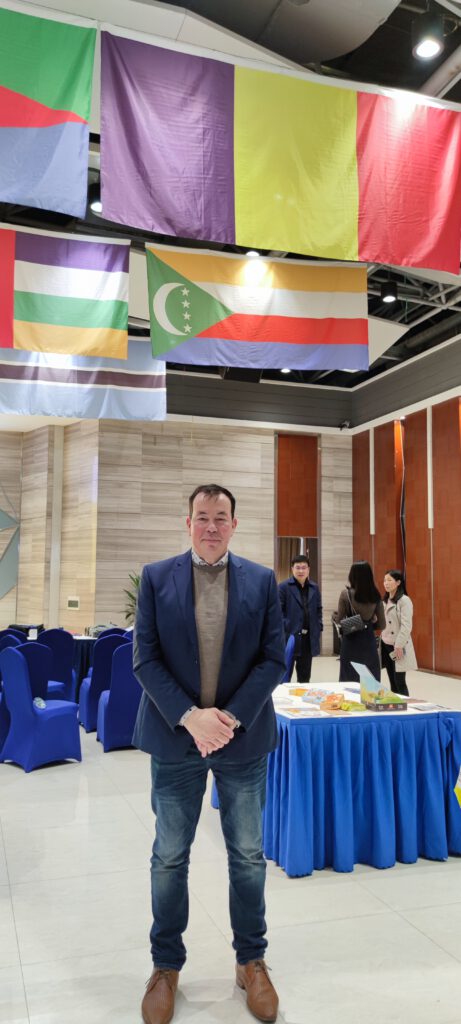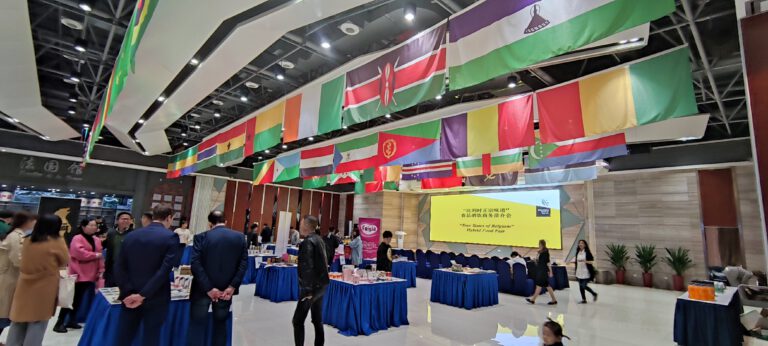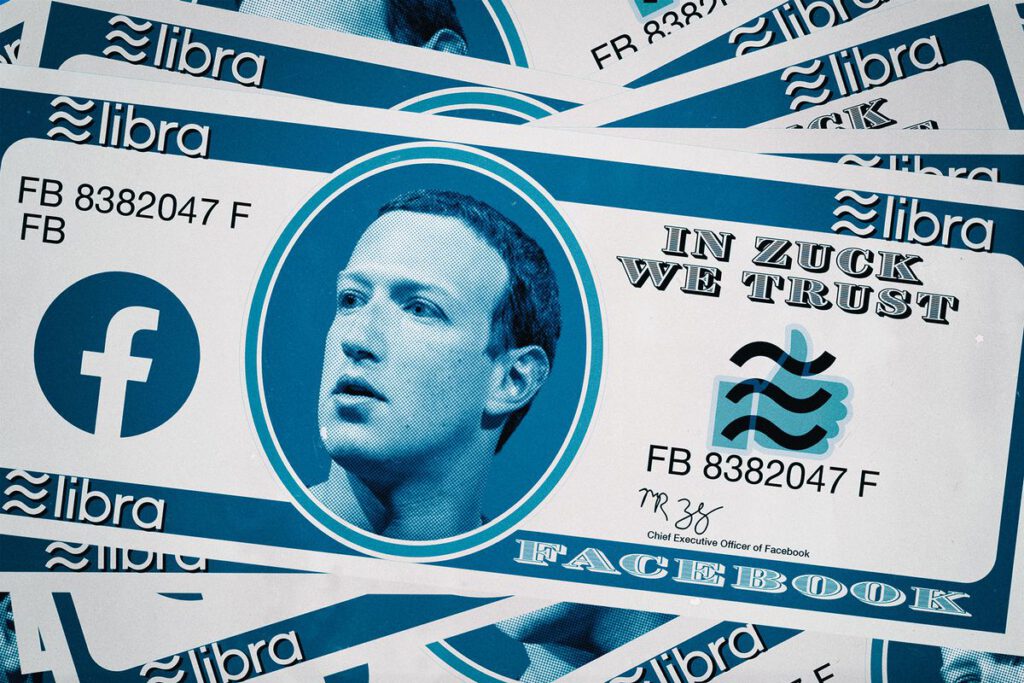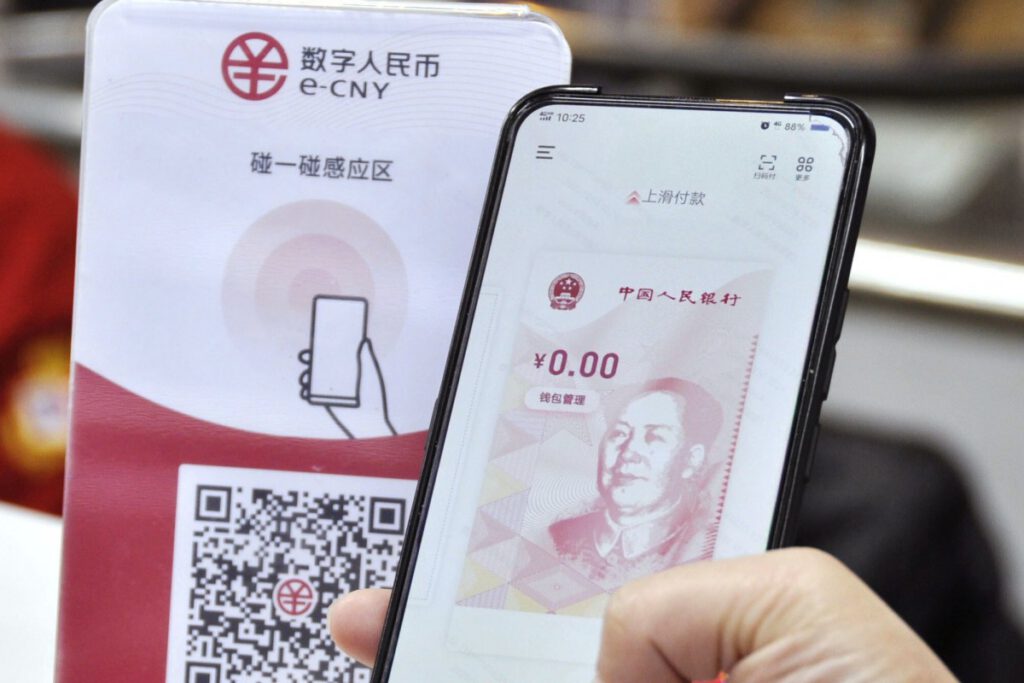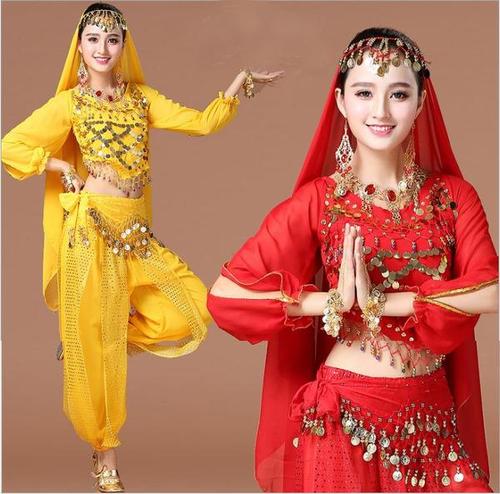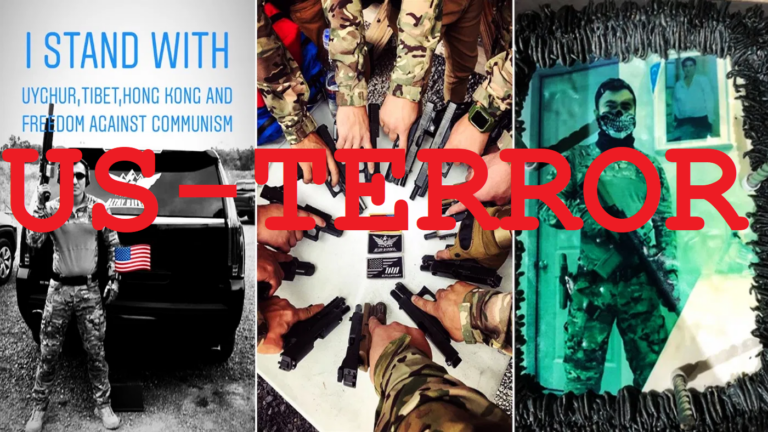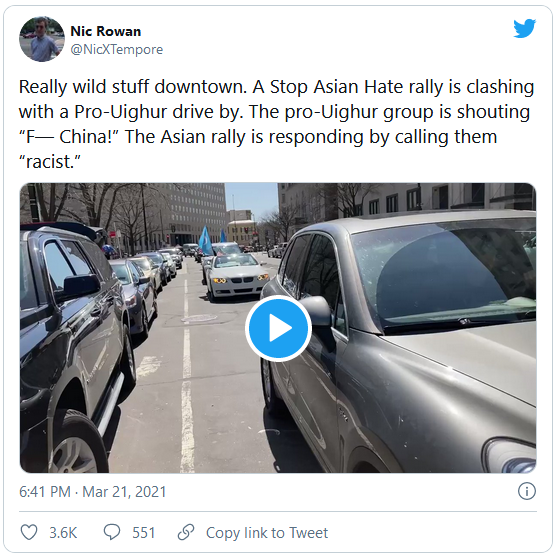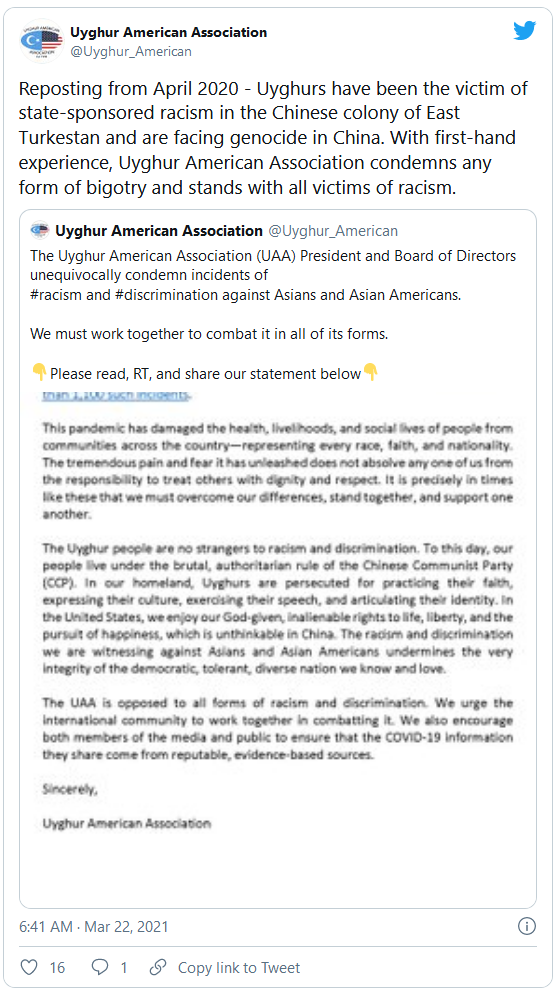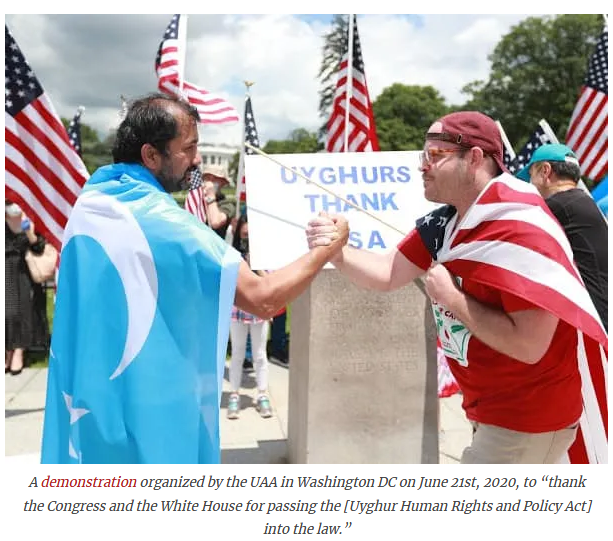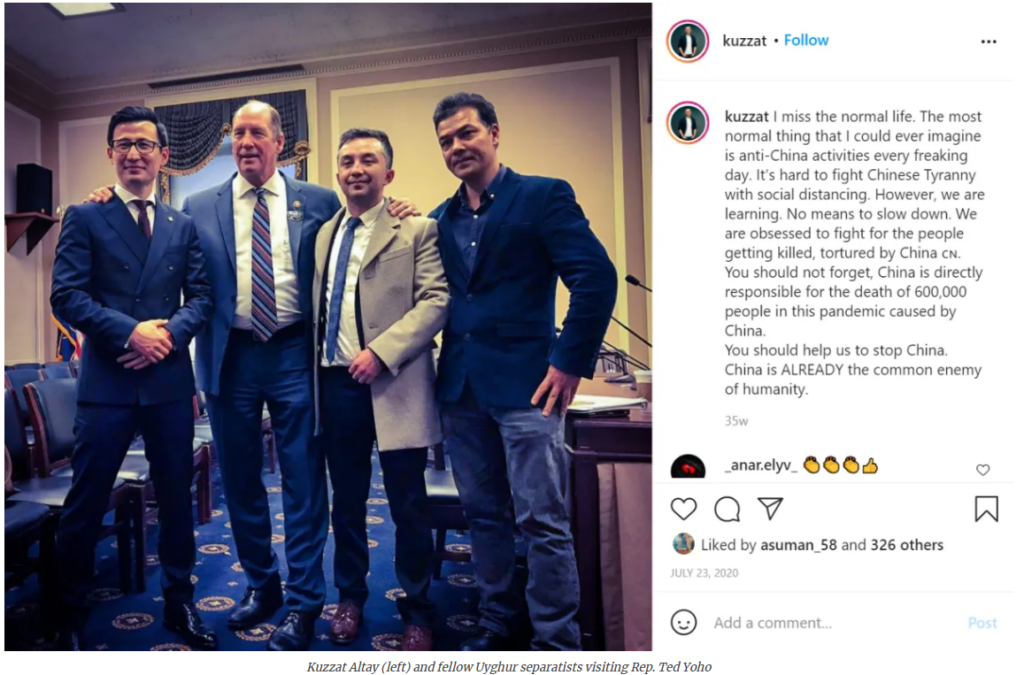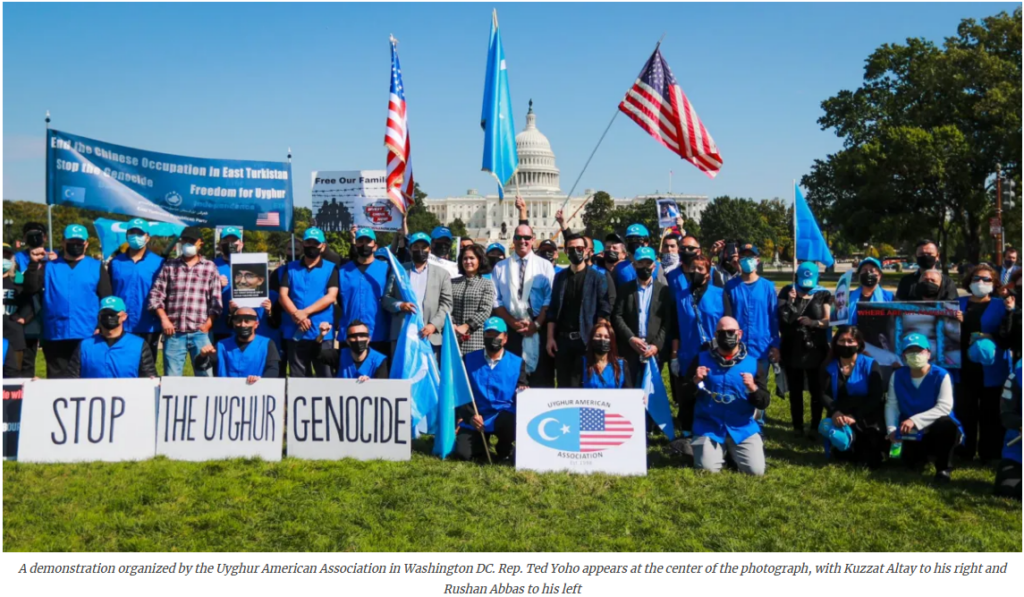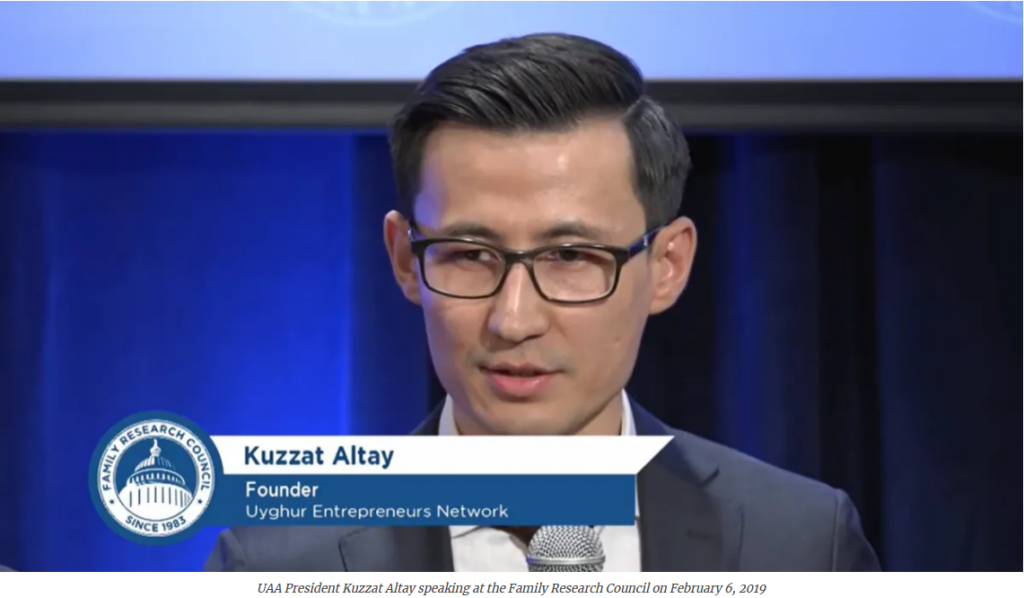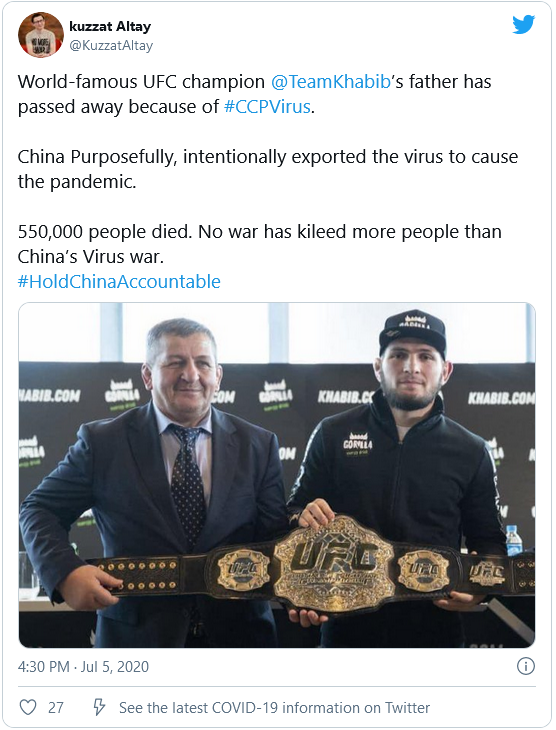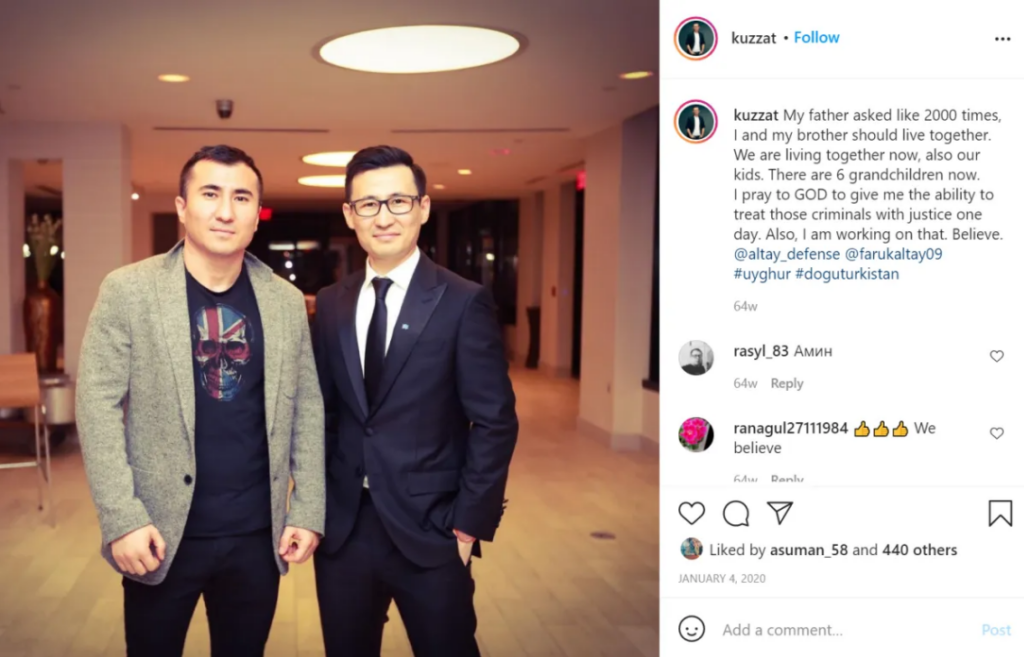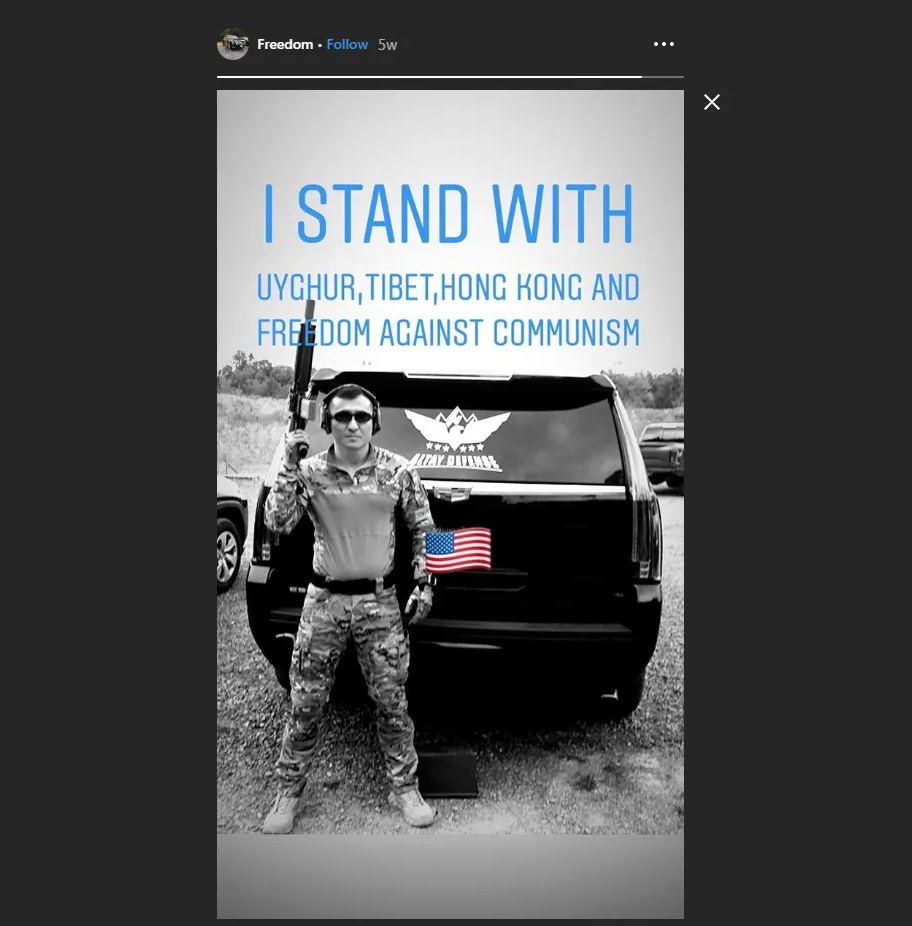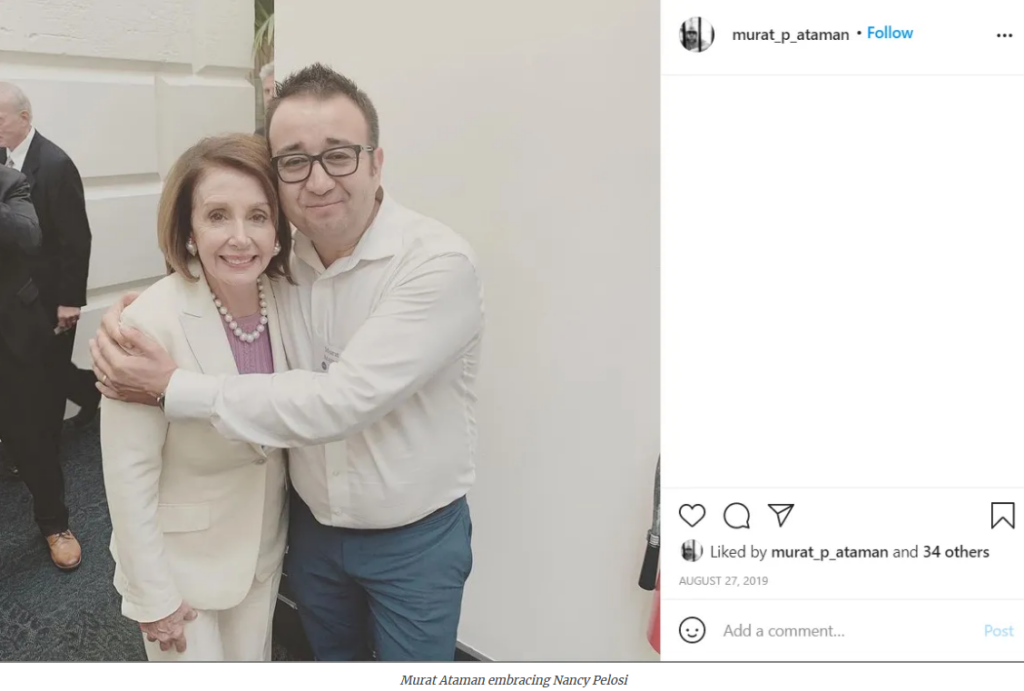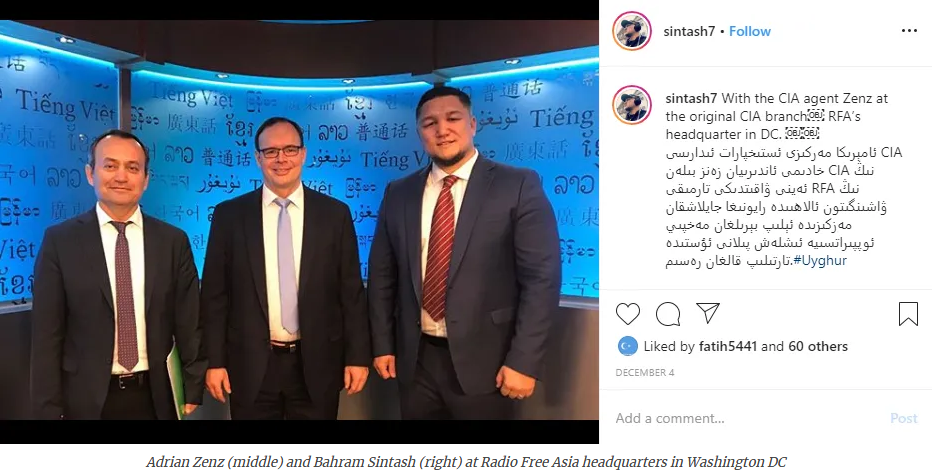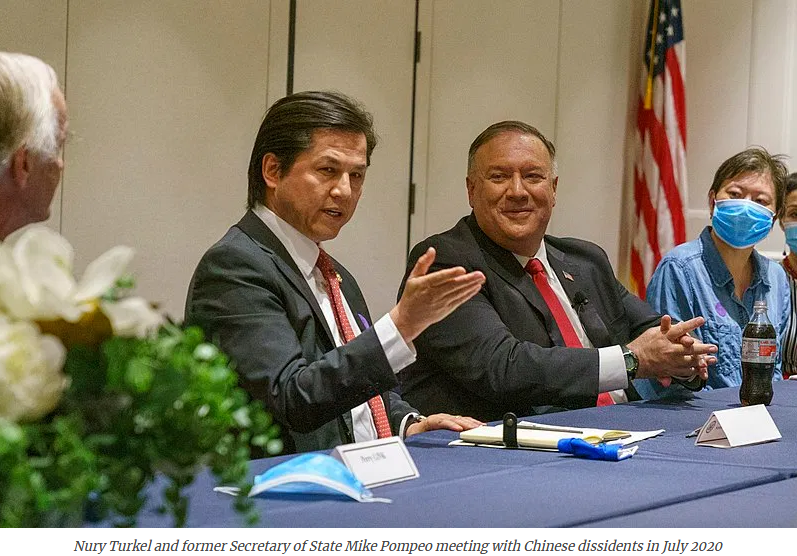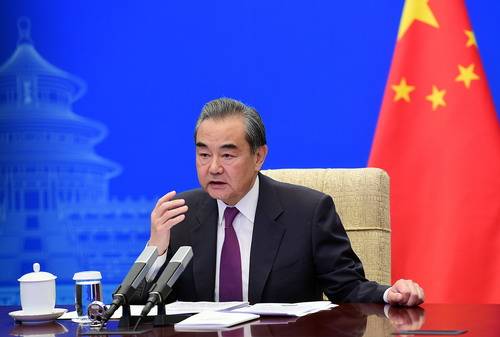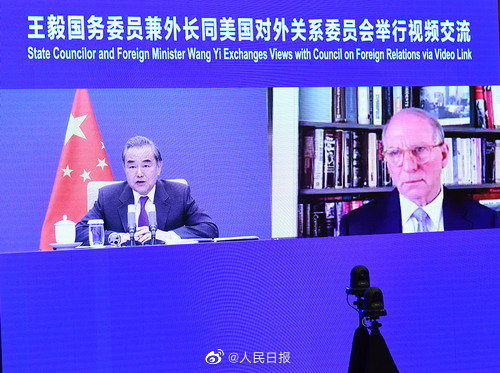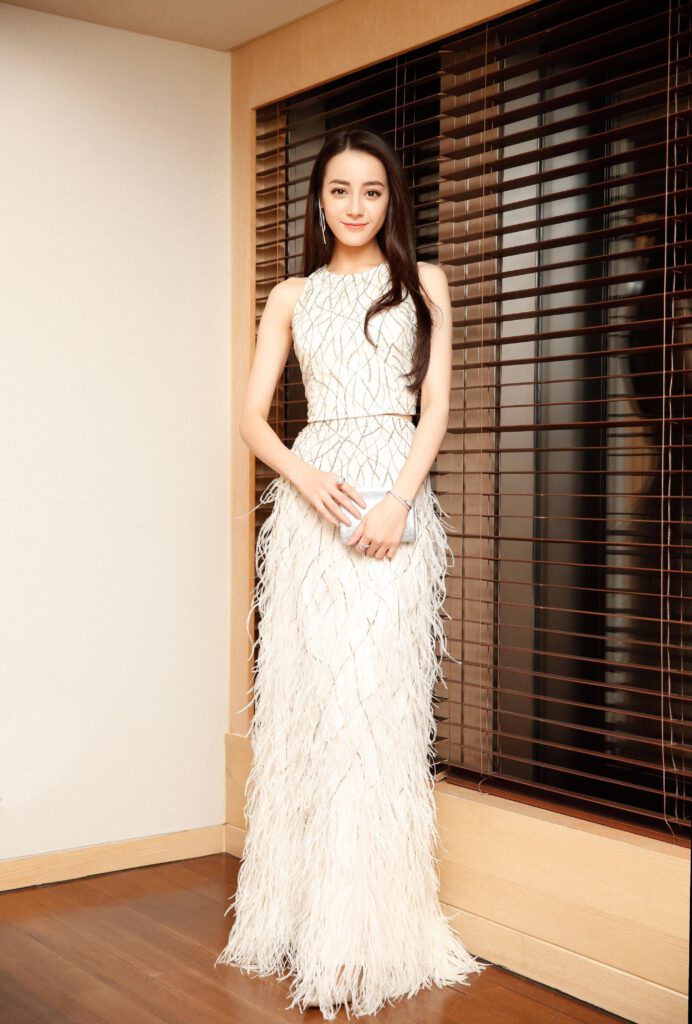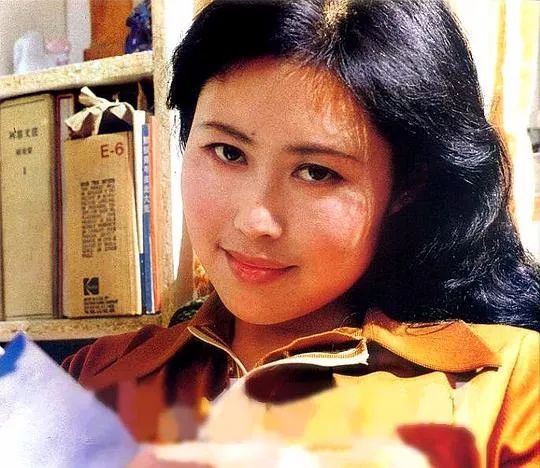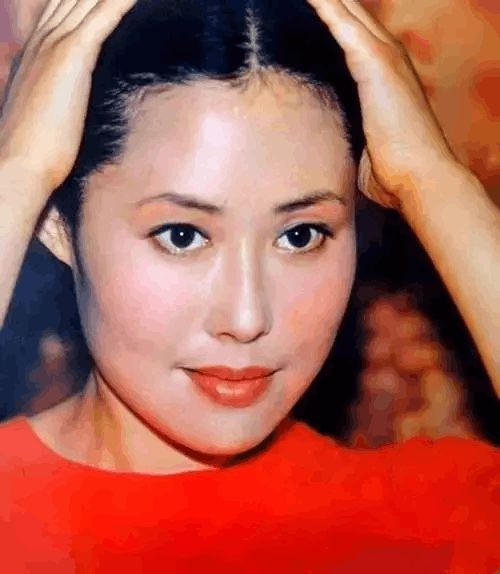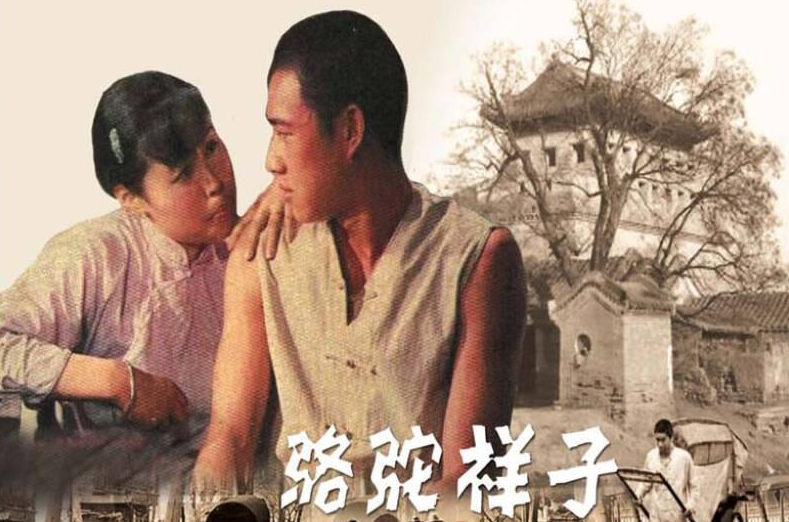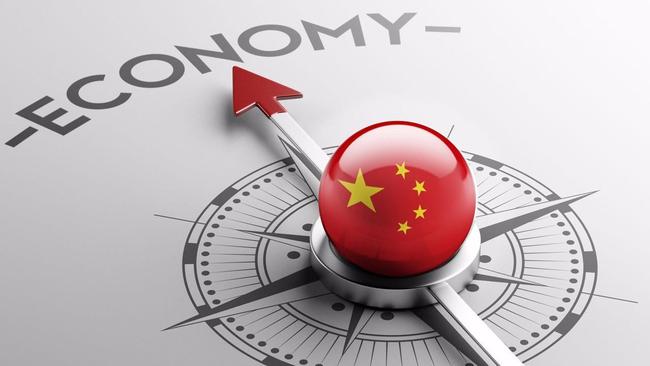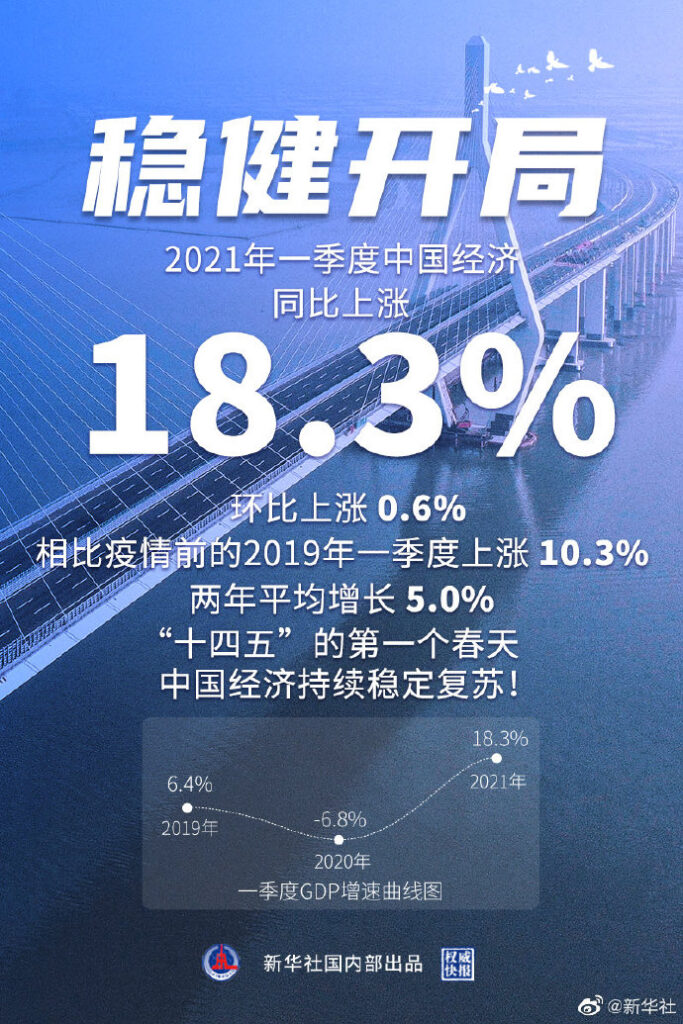Cultivated by the US government as human rights activists, Uyghur American Association leaders partner with far-right lawmakers and operate a militia-style gun club that trains with ex-US special forces.
By Ajit Singh, a lawyer and journalist. He is a contributing author to Keywords in Radical Philosophy and Education: Common Concepts for Contemporary Movements (Brill: 2019). He tweets at @ajitxsingh.
On March 21, US-government-funded Uyghur activists were caught on video disrupting a gathering against anti-Asian racism in Washington DC, barking insults at demonstrators including, “Wipe out China!” and “Fuck China!” The Uyghur caravan flew American and “East Turkestan” flags and drove vehicles adorned signs bearing slogans such as, “We Love USA,” “Boycott China,” and “CCP killed 80 million Chinese people.”
Organized by the Uyghur American Association (UAA), the drive-by heckling of anti-racist demonstrators drew widespread condemnation on social media, including from other sections of the Uyghur separatist movement. Salih Hudayar, the self-proclaimed “Prime Minister of the East Turkistan Government-in-Exile,” slammed “the UAA’s reckless drive-by” for causing “severe backlash against Uyghurs,” and insisted that Uyghur Americans were “not racist.”
The UAA has attempted to distance itself from accusations of extremism and racism, stating that its members’ actions were misrepresented. Despite refusing to rescind their call for China to be “wiped out,” the UAA declared that it “condemns any form of bigotry and stands with all victims of racism.”
However, an investigation by The Grayzone into the Uyghur separatist movement in the Washington DC area has uncovered a jingoistic, gun-obsessed subculture driven by the kind of right-wing ideology that was on display during the March 21 car caravan through downtown.
Leading figures of the UAA operate a right-wing gun club known as Altay Defense. Proudly dressed in US military fatigues, Altay Defense drill in advanced combat techniques with former members of US special forces who also train private mercenaries and active duty US service members. Members of the militia-style gun club espouse pro-Trump politics and anti-immigrant resentment.
The UAA is the US-affiliate of the World Uyghur Congress (WUC), an international network whose first president outlined an objective to precipitate the “fall of China” and establish an ethno-state in Xinjiang. The recipient of millions of dollars of funding the National Endowment for Democracy (NED), a US government-sponsored entity, this network works closely with Washington and other Western governments to escalate hostilities with China.
Despite claiming to represent the interests of China’s Uyghur and Muslim minority populations, many of the UAA’s closest allies represent some of the anti-Muslim, far-right forces in Washington, from Republican Rep. Ted Yoho to the Family Research Council, as well as the FBI.
During the pandemic, the UAA and members of its affiliate organizations helped inflame anti-Asian resentment by spreading far-right propaganda referring to Covid-19 as the “Chinese virus,” and claimed that China was waging a “virus war” against the world, “[p]urposefully, intentionally export[ing] the virus to cause the pandemic.”
Behind its carefully constructed image as a peaceful human rights movement, the UAA and its offshoots in the DC-based Uyghur separatist lobby are driven by far-right ideology and envision themselves as militant foot soldiers for empire.
“I belong to America!” Uyghur human rights leader teams up with far-right, Islamophobes in anti-China crusade
The UAA’s ultra-patriotic reverence of the US and fanatical anti-China politics have been on full display under the organization’s current president, Kuzzat Altay.
Altay frequently takes to social media to make his allegiance to Washington known.
“May GOD bless you American Veterans! May GOD bless America!” declared Altay on Veterans Day in 2019.
Shortly following the illegal US assassination of Iranian Major General Qasem Soleimani, Altay left no doubt as to where he stands: “Looks like the war just started […] I belong to America!”
Amid the US uprisings against police brutality and systemic racism sparked by the murder of George Floyd, Altay chided Black Lives Matter protesters, saying that he “support[ed] peaceful protestors […] but do[es] not support looters, rubbers [sic] and criminals”
“Your LOVE for #America should be greater than your HATE for #Trump,” Altay pronounced.
The degree of Altay’s infatuation with the US is only matched by the ferocity of his enmity towards China. “The most normal thing that I could ever imagine is anti-China activities every freaking day,” Altay stated on July 25, 2020. “You should help us to stop China. China is ALREADY the common enemy of humanity.”
Altay is a staunch supporter of Washington’s new Cold War agenda. Applauding the Trump administration’s trade and technology war, Altay declared “[a]ll counties [sic] should treat #Huawei as war criminals.”
Despite claiming to be the international representatives of Xinjiang’s predominantly Muslim, Uyghur ethnic group, and struggling against religious persecution, Altay and his comrades have routinely teamed up with far-right, Islamophobic forces in the US to advance their separatist campaign.
The UAA has worked closely with Republican Rep. Ted Yoho, a homophobic, anti-abortion ultra-conservative who once told a Black constituent that he was not sure if the Civil Rights Act was constitutional. Yoho was one of only four lawmakers to vote against legislation making lynching a federal hate crime. In a high-profile dust-up on Capitol Hill, he reportedly called Rep. Alexandria Ocasio-Cortez a “fucking bitch.” In 2019, Yoho was one of 24 members of Congress to vote against a resolution condemning bigotry because it included anti-Muslim discrimination.
Yoho has also ardently supported regime change in Venezuela, defended US missile strikes against Syria, and proclaimed that the “US army must defend Taiwan” against China.
In 2019, Altay spoke on a panel of US government-funded Chinese dissidents organized by the Family Research Council (FRC). The FRC has been designated a hate group by the Southern Poverty Law Center (SPLC) due to its extreme anti-LGBTQ, anti-choice, and anti-Muslim ideology.
Retired US General and undersecretary for defense under former President George W. Bush, Jerry Boykin, serves as the FRC’s vice president. Boykin is a virulent Islamophobe who believes that the religion is evil and should be outlawed, and that there should be “no mosques in America.” During a sermon at an evangelical church during the US war on Iraq, Boykin boasted of taking on a Muslim warlord in Somalia: “I knew my God was bigger than his. I knew that my God was a real God and his was an idol,” he declared. Boykin’s anti-Muslim tirades grew so extreme that he was investigated by the US Department of Defense and drew a rebuke from Bush.
In recent years, Altay has organized several events for Uyghur Americans in collaboration with the FBI, the federal law enforcement agency notorious for its surveillance of Muslim Americans and ensnaring countless mentally troubled young Muslim American men in manufactured terror plots. In 2020, the UAA organized an “FBI Workshop for Uyghur Community” which aimed to teach Uyghur Americans about “the role of the FBI in protecting Uyghurs” and how “Uyghurs [can] communicate with the FBI”.
Throughout the pandemic, Altay and fellow leaders of the Uyghur separatist movement have incessantly spread right-wing conspiracy theories blaming China for Covid-19 and all related deaths. Such disinformation has played a key role in whipping up anti-Asian racism in the US and West.
Altay’s Twitter page is an endless stream of noxious, far-right coronavirus-related propaganda.
“I support @realDonaldTrump’s decision to call it ChineseVirus,” declared Altay on March 18, 2020, defending Trump against criticism from “[p]eople whining about racism.” Altay also routinely referred to Covid-19 as “Wuhan virus” and “CCP virus”, as have WUC leaders such as Dolkun Isa and Rushan Abbas.
Altay promoted Steve Bannon’s claims that the “CCP unleashed [Covid-19] on the world”, and would later echo this sentiment. “China [p]urposefully, intentionally exported the virus to cause the pandemic,” Altay declared on July 5, 2020. “No war has kileed [sic] more people than China’s Virus war.”
Altay also endorsed right-wing conspiracy theories which claimed that Covid-19 was engineered as a bioweapon in a Wuhan lab and the World Health Organization was controlled by the Chinese government.
Kuzzat Altay’s political activities are a reflection of the deeply rooted right-wing culture that pervades the Uyghur separatist movement.
Foot soldiers for empire: Uyghur human rights activists training with US military instructors for “mission readiness”
Leading members of UAA have founded Altay Defense, which arranges for constituents in the Uyghur separatist movement to receive arms training by former US special forces soldiers and instructors. The organization boasts that “[a]ll security training [is] provided by former special force officer!”
A mission statement published by Shadow Hawk Defense outlines a goal to train “elite armed security professionals, who serve the high threat needs of the US government, military, and intelligence communities,” including “hosting and training classified security personnel.” The facility employs “trainers [who] have years of experience training contractors for the U.S. Government” with the goal of “achieving mission readiness.”
In a recent interview, Shadow Hawk’s co-founder and Director of Training, Randy Weekely, described his work in detail: “I teach military contractors before they deploy to these ‘other places’, defensive tactics, CQB [close-quarters battle], pistol, rifle, bounding, attack on vehicles, all the skills that they need […] before they deploy.”
Altay Defense receives instruction from James Lang, a former US Army Ranger who served in Afghanistan and Iraq and works as a firearm instructor for the US Department of Defense. Lang also operates Ridgeline Security Consultants, which provides firearms and tactical training to “prepare law enforcement officers [and] armed security professionals […] to survive and win deadly force confrontations.”
Leaving little to the imagination, UAA members conduct training using assault rifles while dressed in official-seeming battle dress fatigues bearing the US flag.
Altay Defense is led by Faruk Altay, brother of UAA President Kuzzat Altay and nephew of Rebiya Kadeer, who is perhaps the most prominent international figurehead of the Uyghur separatist movement.
A look at Faruk Altay’s online activity reveals him to be a far-right, anti-communist, ultra-nationalist.
“Trump is the best!!!” Altay posted to Twitter in 2018. Altay also expressed support for Trump’s border wall and seemingly justified the “Stop the Steal” Capitol riot which took place on January 6, 2021. He has also shared an anti-immigrant meme comparing Central American migrants to the international criminal gang MS-13.
Faruk Altay flaunts his dedication to the US military, posting images on social media of himself dressed in US military fatigues, wearing a skull face mask, and holding an assault rifle, with captions reading: “I STAND WITH UYGHUR, TIBET, HONG KONG, AND FREEDOM AGAINST COMMUNISM”.
Altay refers to himself as a “freedom fighter” taking “revenge for my father,” and refers to his children as “[m]y future West Point officers!
Far from a lone wolf, Faruk Altay has been joined by leading figures of the Uyghur separatist movement. Social media posts show UAA President Kuzzat Altay, Murat Ataman, and Bahram Sintash, among others attending Altay Defense training sessions.
Murat Ataman is affiliated with the National Endowment for Democracy (NED)– the funding engine of the US government’s regime change apparatus – UAA offshoot Uyghur Human Rights Project. A veteran of the Uyghur separatist movement, Ataman he works for US military and intelligence contractor, General Dynamics, and has previously held positions at the Department of Defense, Department of Homeland Security and Department of Veteran Affairs.
Bahram Sintash is also affiliated with the NED-funded UHRP, authoring reports which allege that the Chinese government is demolishing Uyghur mosques and shrines. Sintash was a key player in lobbying efforts to urge the US Congress to pass the Uyghur Human Right Policy Act of 2019, visiting more than 380 members of Congress.
In his spare time, Sintash keeps company with the far-right, evangelical Xinjiang researcher Adrian Zenz. During a meeting at Radio Free Asia (RFA), Sintash referred to Zenz as “the CIA agent,” and the US government-sponsored broadcasting service as “the original CIA branch of RFA’s headquarters in DC.”
While Sintash may have been sarcastic, the New York Times has described RFA in no uncertain terms as part of a “Worldwide Propaganda Network Built by the CIA.”
As prone as they might be to unalloyed expressions of right-wing jingoism, the leaders of UAA operate at the heart of a multi-million dollar lobbying complex funded and cultivated by the US government.
Uyghur separatist movement cultivated by the US government for “toppling” Beijing
Established in 1998, the Uyghur American Association (UAA) is the Washington DC-based affiliate of the World Uyghur Congress (WUC), which claims to be “the sole legitimate organization of the Uyghur people” around the world. Portrayed by Western governments and media as the leading voice for Uyghur interests and human rights, the WUC has played a central role in shaping Western understanding of Xinjiang.
As The Grayzone previously reported, the WUC is a right-wing, anti-communist, and ultra-nationalist network of exiled Uyghur separatists who have stated their intention to bring about the “fall of China” and establish an ethno-state called “East Turkestan” in Xinjiang. The WUC has developed deep ties to Washington’s regime change establishment and received extensive US government-funding and training.
In recent years, the WUC has worked closely with US and Western governments, and partnered with fraud-prone pseudo-scholars such as Adrian Zenz to intensify their New Cold War against China, advocating for Chinese policy in Xinjiang to be labeled ‘genocide,’ along with sanctions and boycott.
The National Endowment for Democracy (NED) has been central to the rising international prominence of the Uyghur separatist movement. In 2020, the NED boasted that it has given Uyghur groups $8,758,300 since 2004 (including $75,000 in annual funding to the UAA) and claimed to be “the only institutional funder for Uyghur advocacy and human rights organizations.”
“As a result of NED’s support, the Uyghur advocacy groups have grown both institutionally and professionally over the years,” said Akram Keram, a program officer and regional expert at NED. “These groups played critical roles in introducing the Uyghur cause in various international, regional, and national settings against China’s false narratives, bringing the Uyghur voice to the highest international levels, including the United Nations, European Parliament, and the White House. They provided firsthand, factual resources documenting the atrocities in East Turkistan, informing and inspiring the introduction of relevant resolutions, sanctions, and calls for action to hold the Chinese Communist Party accountable.”
“The National Endowment for Democracy has been exceptionally supportive of UAA,” echoed former UAA President, Nury Turkel, in 2006, “providing us with invaluable guidance and assistance” and “essential funding.” According to Turkel, thanks to NED support, the “UAA and UHRP have gained a new level of influence and credibility among media organizations in the U.S. and other countries.”
“In short, NED has helped us to increase our credibility in Washington and throughout the world. We are very moved by and grateful for their steadfast assistance,” stated Turkel.
Turkel confirmed that the UAA aims to leverage Washington’s support to advance regime change in China. In 2006, he told his allies, “as we witnessed the ‘Tulip Revolution’ and the toppling of the former government of Kyrgyzstan, our hopes were again reinforced.” Turkel emphasized that the US-sponsored color revolution sent a “strong message” to China, and recalled how he was immediately summoned to Bishkek to coordinate with the new government.
The NED helped the UAA launch the Uyghur Human Rights Project (UHRP) in 2004, serving as its principal source of funding, with $1,244,698 in support between 2016 and ’19 alone. The UHRP has brought together leading figures of the WUC, including Turkel and Omer Kanat, and NED, with former NED Vice President, Louisa Greve, serving as the group’s Director of Global Advocacy.
The UAA’s leadership consists of US national security state operators including employees of the US government, US propaganda network Radio Free Asia, and the military-industrial complex. Past leaders of the organization include:
Nury Turkel, former President (2004-2006) — Co-founded the UHRP with the NED. In 2020, Turkel was appointed a commissioner on the US Commission on International Religious Freedom by Speaker of the House Nancy Pelosi.
Rebiya Kadeer, former President (2006-2011) — A self-described oligarch and longtime figurehead of the Uyghur separatist movement. According to The New York Times, Kadeer’s “[d]issidence brought the end of her Audi, her three villas and her far-flung business empire”. Kadeer’s husband, Sidik Rouzi, worked for US government media outlets Voice of America and Radio Free Asia. Under Kadeer’s leadership, the WUC and UAA forged close ties with the Bush administration.
Ilshat Hassan Kokbore, former President (2016-2019) — Since 2008, Kokbore has worked with notorious private US military and intelligence contractor, Booz Allen Hamilton. Edward Snowden was employed at the firm when he decided to blow the whistle on the National Security Agency’s invasive, all-encompassing system of mass surveillance.
Omer Kanat, former Vice President – Serves as the WUC’s Chairman of the Executive Committee. Kanat helped found the WUC and has been a permanent fixture in its executive leadership. The veteran operative has a lengthy history of work with the US government, from serving as senior editor of Radio Free Asia’s Uyghur Service from 1999 to 2009 to covering the US wars on Iraq and Afghanistan and interviewing the Dalai Lama for the network. In an interview with Grayzone editor Max Blumenthal at a 2018 NED awards ceremony in the US Capitol building, Kanat took credit for furnishing many of the claims about internment camps in Xinjiang to Western media.
Rushan Abbas, former Vice President — Previously boasted in her bio of her “extensive experience working with US government agencies, including Homeland Security, Department of Defense, Department of State, and various US intelligence agencies.” Served the US government and Bush administration’s so-called war on terror as a “consultant at Guantanamo Bay supporting Operation Enduring Freedom.” Following a disastrous publicity appearance on Reddit’s “Ask Me Anything” question and answer forum, during which participants blasted Abbas as a “CIA Asset” and US government collaborator, she has attempted to scrub her biographic information from the internet. Abbas currently heads the WUC affiliate organization, Campaign for Uyghurs.
The UAA current leadership includes:
Kuzzat Altay, President — Nephew of Rebiya Kadeer. As documented above, Altay is a rabid anti-communist and ardently pro-US. He has favorably compared the establishment of Israel to the separatist movement for “East Turkestan.”
Elfidar Itebir, Secretary — Sister of Elnigar Itebir, who was appointed by the Trump administration as Director for China in the White House National Security Council. Itebir’s father, Ablikim Baqi Iltebir, worked for the US government media outlet, Radio Free Asia, from February 2000 to August 2017
Arslan Khakiyev, Treasurer — Previously worked at Radio Free Asia for over 18 years. Khahkiyev’s wife, Gulchehra Hoja, has worked for Radio Free Asia since 2001.
* * *
The weekly deluge of US media reports of Uyghur oppression in Xinjiang is clearly designed to appeal to liberal sensibilities, presenting the struggle of an oppressed minority against a tyrannical government, and omitting any pieces of context that might prove disruptive to the David-versus-Goliath narrative. But it is becoming clear that some profoundly illiberal forces lie behind the veneer of a peaceful campaign for human rights.
The US government has engaged in a marriage of convenience with a Uyghur separatist movement that is firmly aligned the gun-obsessed, anti-immigrant subculture of Trumpism. As the Biden administration turns up the heat on China, it has turned a blind eye to the far-right politics of one of its most important proxy groups.
The UAA did not respond to multiple requests for interviews from The Grayzone sent by email and on Twitter.
(Source: china-uyghur-gun-soldiers-empire – TheGrayZone)

